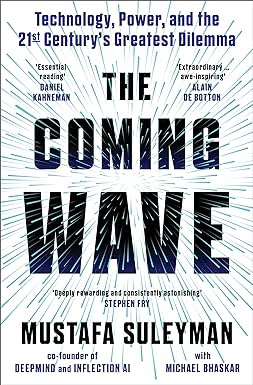The proliferation of technology in waves has been the story, but what if the wave turns out to be a tsunami?
As has been during the previous technological waves – the steam, mechanical and fuel automation - there remains both denial and stoicism for the coming wave of artificial intelligence, A.I. Will the new wave be useful or dangerous, or both. While there are skeptics who argue that the power of AI. has been overestimated, there are others who believe it will accelerate unprecedented human progress. Geoffrey Hinton, known as the father of AI, is worried that artificial brains may indeed transcend human limits. As the boundaries between the real and the virtual are fast disappearing, technology is indeed expanding what it means to be human.
Each technological wave in the last 100 years did change the world despite Luddite protests, named after a mythical figure, called Ned Ludd, that had challenged automation of textile manufacturing to begin with. Their pain and disruption were real, but so have been the improvements in living standards that we enjoy unthinkably till today. The proliferation of technology in waves has been the story of Homo technologicus ever since, but Sulayman’s concern is what if the wave turns out to be a tsunami? With AI fast outperforming all human cognitive abilities, the unprecedented opportunities on offer hold dangerous consequences too.
The basic premise for any technological progress is to enrich our lives, and that has broadly been the case with it thus far. However, artificial intelligence and synthetic biology are two general purpose technologies whose scope of impact still remains understated. Given that these technologies hyper-evolve with an increasingly autonomous asymmetric impact, it generates powerful incentives for geopolitical competition with massive financial rewards but without a strong regulatory mechanism. The consequences of AI powered automated wars, bio-engineered pandemics, and technological authoritarianism have already been put to practice. A founder of two AI companies, Sulayman stresses the compelling need for ‘containing’ uncontainable technologies because our species is not wired to grapple with technological transformation at this scale, let alone the potential of technology to belittle and fail us.
The Coming Wave is absolutely clear, seamlessly compassionate, and immensely powerful listing of the most consequential issues of our times. Behind technological breakthroughs have been people but not anymore as AI has taken over people in the present scheme of things. Think of Open AI’s GPT models which are brain like as they involve billions of artificial neurons, profoundly different from human brain. The artificial neural nets don’t acquire knowledge organically as humans do, by having experiences and reality, but use a combination of data immortality and computing replicability to take over biological intelligence.
There is no denying the fact that AI and immersive media will permeate society, blurring the boundaries between the real and the virtual while unleashing significant new risks to our privacy, autonomy, and even our identity. Not far is the time when the majority of our daily interactions will not be with other people but with AI, if not already there. While unfolding significant features of the technological wave of intelligence, Suleyman enlists several critical aspects that hold the potential to amplify fragility of human survival – with a power to destroy us as well. In saying so, however, the techpreneur author remains optimist.
Global living conditions may be better today than at any time in the past, yet there is lot yet to be achieved. The Coming Wave cautions that even in best-case scenarios the coming wave will be an immense shock to the systems governing societies. The question worth exploring is whether the nation-states are in any shape to meet the challenges ahead? Declining public trust, rising inequality, and a warming climate is unlikely to absorb the destabilizing force of the wave. The essential challenge, the author argues, is to maintain control over powerful technologies.
AI is not only a technology but a way of future life that is hard to imagine and comprehend. No wonder, following the release of GPT-4, thousands of AI scientists called for a six-month moratorium on further research on the most powerful AI models. Despite debates and discussions on the emerging possibilities of AI, rarely anything is heard about containing it. Suleman makes a compelling case for policy makers and security experts to address the ‘containment challenge’ by developing regulatory framework for AI that works well in places as diverse as the Netherlands and Nicaragua, New Zealand and Nigeria. The Coming Wave provides a much-needed narrative on the potentially anticipated and yet disastrous consequences of AI. The easy-to-read book provides a persuasive roadmap for containing the technology rather than to be contained in it.
by Mustafa Suleyman
Bodley Head/Penguin RandomHouse, New Delhi
Extent: 332, Price: Rs. 799.
First published in Deccan Herald on Dec 10, 2023.

No comments:
Post a Comment